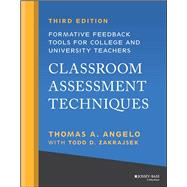Classroom Assessment Techniques Formative Feedback Tools for College and University Teachers
, by Angelo, Thomas A.; Cross, K. Patricia- ISBN: 9781119860167 | 1119860164
- Cover: Paperback
- Copyright: 2/28/2024
Classroom Assessment Techniques: Formative Feedback Tools for College and University Teachers
A practical, research-based handbook for using assessment to improve learning.
This completely revised and updated third edition of Classroom Assessment Techniques provides a research-based, engaging guide to assessing student learning where it matters most—at course and classroom levels. Informed by the latest international educational research and 30 years of classroom assessment practice, this practical handbook is designed for postsecondary teachers from all disciplines, faculty and academic developers, and assessment professionals. It offers field-tested guidance, tools, and advice for planning, designing, and implementing formative assessment in face-to-face, hybrid, and fully online classrooms, analyzing resulting data, and using that data to improve student learning.
Classroom Assessment Techniques, 3rd Edition, is a practical, clearly written handbook for busy professionals. It contains a wealth of useful resources, including:
- 50-plus CATs (classroom assessment techniques) – flexible formative assessment tools easily adaptable for use in a wide range of disciplines and contexts.
- Case studies and examples illustrating how college and university faculty have applied these techniques to improve learning
- A new “Course Learning Outcomes Inventory” (CLOI)—a self-assessment tool for identifying and prioritizing the most relevant learning outcomes to assess
- The original “Teaching Goals Inventory” (TGI) which offers an alternate, teaching-focused approach to setting assessment priorities
- Multiple ways to quickly find the most appropriate tool. CATs are indexed by discipline examples, Bloom’s Taxonomy, Biggs and Tang’s SOLO Taxonomy, the CLOI, and the TGI
- Brief chapters explaining what formative assessment is, how it can improve student learning, how to gather and provide formative feedback, how to link classroom assessment with broader/other assessment efforts, and how to collaborate with students and colleagues
Each CAT provides a brief, self-contained “recipe” including a description, steps for implementation, dos and don’ts, and relevant references






